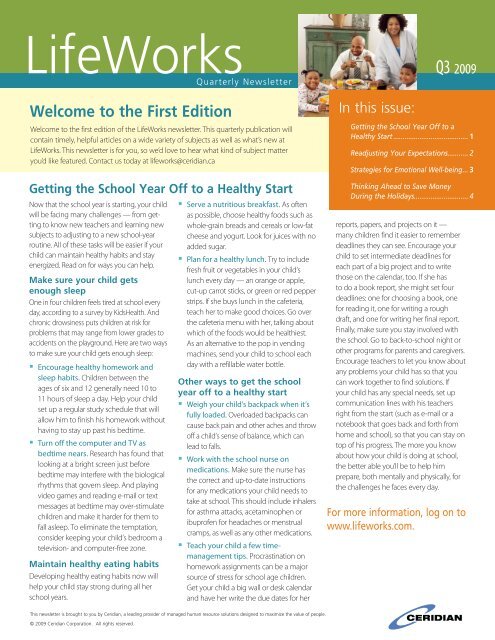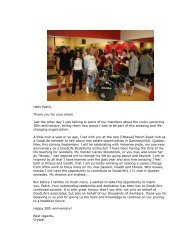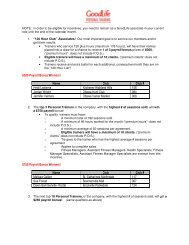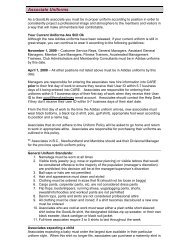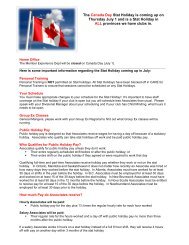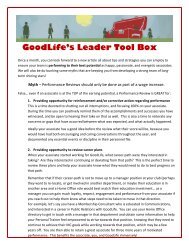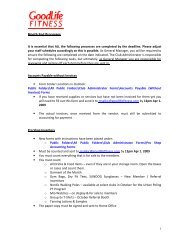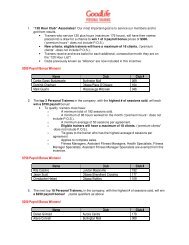LifeWorksQuarterly NewsletterQ32009Welcome to the First EditionWelcome to the first edition of the LifeWorks newsletter. This quarterly publication willcontain timely, helpful articles on a wide variety of subjects as well as what’s new atLifeWorks. This newsletter is for you, so we’d love to hear what kind of subject matteryou’d like featured. Contact us today at lifeworks@ceridian.caGetting the School Year Off to a Healthy StartNow that the school year is starting, your childwill be facing many challenges — from gettingto know new teachers and learning newsubjects to adjusting to a new school-yearroutine. All of these tasks will be easier if yourchild can maintain healthy habits and stayenergized. Read on for ways you can help.Make sure your child getsenough sleepOne in four children feels tired at school everyday, according to a survey by KidsHealth. Andchronic drowsiness puts children at risk forproblems that may range from lower grades toaccidents on the playground. Here are two waysto make sure your child gets enough sleep:ßßEncourage healthy homework andsleep habits. Children between theages of six and 12 generally need 10 to11 hours of sleep a day. Help your childset up a regular study schedule that willallow him to finish his homework withouthaving to stay up past his bedtime.Turn off the computer and TV asbedtime nears. Research has found thatlooking at a bright screen just beforebedtime may interfere with the biologicalrhythms that govern sleep. And playingvideo games and reading e-mail or textmessages at bedtime may over-stimulatechildren and make it harder for them tofall asleep. To eliminate the temptation,consider keeping your child’s bedroom atelevision- and computer-free zone.Maintain healthy eating habitsDeveloping healthy eating habits now willhelp your child stay strong during all herschool years.ßßServe a nutritious breakfast. As oftenas possible, choose healthy foods such aswhole-grain breads and cereals or low-fatcheese and yogurt. Look for juices with noadded sugar.Plan for a healthy lunch. Try to includefresh fruit or vegetables in your child’slunch every day — an orange or apple,cut-up carrot sticks, or green or red pepperstrips. If she buys lunch in the cafeteria,teach her to make good choices. Go overthe cafeteria menu with her, talking aboutwhich of the foods would be healthiest.As an alternative to the pop in vendingmachines, send your child to school eachday with a refillable water bottle.Other ways to get the schoolyear off to a healthy startß Weigh your child’s backpack when it’sfully loaded. Overloaded backpacks cancause back pain and other aches and throwoff a child’s sense of balance, which canlead to falls.ß Work with the school nurse onmedications. Make sure the nurse hasthe correct and up-to-date instructionsfor any medications your child needs totake at school. This should include inhalersfor asthma attacks, acetaminophen oribuprofen for headaches or menstrualcramps, as well as any other medications.ß Teach your child a few timemanagementtips. Procrastination onhomework assignments can be a majorsource of stress for school age children.Get your child a big wall or desk calendarand have her write the due dates for herIn this issue:Getting the School Year Off to aHealthy Start......................................... 1Readjusting Your Expectations........... 2Strategies for Emotional Well-being... 3Thinking Ahead to Save MoneyDuring the Holidays............................. 4reports, papers, and projects on it —many children find it easier to rememberdeadlines they can see. Encourage yourchild to set intermediate deadlines foreach part of a big project and to writethose on the calendar, too. If she hasto do a book report, she might set fourdeadlines: one for choosing a book, onefor reading it, one for writing a roughdraft, and one for writing her final report.Finally, make sure you stay involved withthe school. Go to back-to-school night orother programs for parents and caregivers.Encourage teachers to let you know aboutany problems your child has so that youcan work together to find solutions. Ifyour child has any special needs, set upcommunication lines with his teachersright from the start (such as e-mail or anotebook that goes back and forth fromhome and school), so that you can stay ontop of his progress. The more you knowabout how your child is doing at school,the better able you’ll be to help himprepare, both mentally and physically, forthe challenges he faces every day.For more information, log on towww.lifeworks.com.This newsletter is brought to you by Ceridian, a leading provider of managed human resource solutions designed to maximize the value of people.© 2009 Ceridian Corporation. All rights reserved.
LifeWorksQuarterly NewsletterReadjusting Your ExpectationsQ32009The changing economy has forced many torethink their expectations for the future. Somepeople are putting off retirement or returningto the workforce because their savings havebeen hit by the financial crisis. Others are readjustingtheir spending habits and budgets,and many are reflecting on the place thatmoney and possessions have in their lives.Change in life is inevitable, but suddenunexpected change can create anxiety anduncertainty. A key to successfully weatheringchange is to accept that you don’t have fullcontrol over what happens and to focus onthose areas you do have some control over.Adjusting to changes in yourfinancial situationTaking practical steps to manage financialchange can help you with the emotionaladjustment of living with less. Here are someways to maximize what you have and bringmoney into your household.ßßRethink how you spend money. You maybe tempted to keep up familiar spendingpatterns by using credit cards or dippinginto savings. But if you have less money tospend, put a halt to unnecessary purchasesso you don’t get into serious debt.Review your budget. Look for expensesto trim or to cut out entirely. Putting arevised spending plan down on paper willhelp to clarify your spending priorities.ßßConsider ways to supplement yourincome. You may be able to increase yourincome by working more hours at yourcurrent job or even working a second jobtemporarily. Many people also find waysof earning income on the side by sellingthings they have or make, or providingservices like babysitting or car repair. If youhave an extra room in your home, considerrenting that out for extra income.Delay retirement. If you were planningon retiring soon, you can increase yourretirement income by seven percent ifyou continue working for one year, and22 percent if you work for four more years,according to a U.S. study by T. Rowe Price.Adjusting emotionallyIt’s normal to feel upset and anxious whenyou experience a sudden change. A healthyway to deal with these negative emotions isto accept that you need to rework your plansfor the future and find ways to adjust.ßFind opportunities in the change. Anychange — even an unwelcome one — canbring new opportunities to learn and grow.The decision to go back to work or to findnew ways to earn money might lead you torediscover long-forgotten skills or inspire youto learn new ones. Adapting to the changecan make you stronger and better preparedfor the next challenge that comes your way.ßßTake pride in your coping skills. Takingcontrol of spending is a source of pridefor most people. Finding bargains in thegrocery store, for example, can put a smileon any shopper’s face. You might alsoconsider doing more around your homeon your own instead of hiring others to doit. For example, learn how to make minorcar repairs so you can hold onto yourvehicle longer. Do home maintenanceyourself. Allow yourself to take pride inyour efforts to stretch your money.Take stock of your life. Remind yourselfof what is most important to you. Afinancial or other crisis often forces us tofocus on our priorities and to rememberwhat we truly value in life. Even if thefinancial downturn means that you haveto make a major change, such as movinginto a new home, step back and look atwhat you still have. Instead of dwelling onwhat you’ve lost, focus on those thingsthat you value, such as your family andfriends.If you are having difficulty adjusting to thefinancial or other changes in your life, contactLifeWorks for more resources about coping withchange and dealing with financial hardship.For more information, log on towww.lifeworks.com.What’s New at LifeWorks?The Divorce Toolkit.This bilingual, online“toolkit” includes two downloadable audiorecordings – one dealing with the emotional aspects of divorce, thesecond with the legal process – as well as downloadable articlescontaining yet more practical advice and information.The Will Kit.Have you made a Will yet? This complete Will kit provides valuableinformation and guidance to help you prepare your Will and puttogether an estate plan for you and your family.There’s much more new on LifeWorks Online. Go to www.lifeworks.com to see for yourself!Why Don’t We Do It In Our Sleeves?Many diseases, including the flu, are spread by coughing and sneezing.This fun, five minute video was designed to encourage people tocough and sneeze according to the infection control guidelines putforth by the Centers for Disease Control and Prevention.Preparing for a Flu Pandemic.This booklet answers questions about pandemic flu, how to bestprotect yourself and your family, how to prepare for such a situation,and how to find resources to help you stay informed.© 2009 Ceridian Corporation. All rights reserved.
- Page 1 and 2: GoodLife Holiday Party Dates and Lo
- Page 3 and 4: Everyone must check in upon arrival
- Page 5 and 6: Hello GoodLife Associates!The Award
- Page 8 and 9: October Feature: Navigating Work an
- Page 10 and 11: 2. to ensure privacy, security and
- Page 12 and 13: TO:CA, GM, DMFROM: Home Office Acco
- Page 14 and 15: The People DepartmentRecruitmentRec
- Page 16 and 17: 2. Email - memberexperience@goodlif
- Page 18 and 19: Specific questions regarding the fo
- Page 20 and 21: Inside FT newsletterHome OfficeMark
- Page 22 and 23: Provide information/applications fo
- Page 24 and 25: Internal Job Postings:Included in t
- Page 26 and 27: • Design and lead personal traini
- Page 28 and 29: QualificationsEducation: Degree or
- Page 30 and 31: Job Posting #4Position: Service Man
- Page 34 and 35: LifeWorksQuarterly NewsletterStrate
- Page 36 and 37: Member Experience Department: A Wel
- Page 38: Frequently Asked Questions:Q. What
- Page 41 and 42: Policy and Procedure HandbookAcknow
- Page 43 and 44: Scent Reduction....................
- Page 45 and 46: Respecting Diversity at GoodLifeHum
- Page 47 and 48: Examples of harassmentHarassment is
- Page 49 and 50: All associates have a responsibilit
- Page 51 and 52: DefinitionsAccommodation: Accommoda
- Page 53 and 54: Complimentary Family Membership aft
- Page 55 and 56: It is the policy of the Canadian Go
- Page 57 and 58: If they can’t continue in the int
- Page 59 and 60: 3. If a new associate does not have
- Page 61 and 62: Fit-Fix WorkoutIn our industry work
- Page 63 and 64: 5. Conduct and behaviour expectatio
- Page 65 and 66: ___________________________________
- Page 67 and 68: Travel Insurance (Out of Province /
- Page 69 and 70: All GoodLife associates regardless
- Page 71 and 72: • The survivor's pension - a mont
- Page 73 and 74: Their entire shift on the public ho
- Page 75 and 76: Timing of BreaksThe time of the bre
- Page 77 and 78: Leaves of Absence with PayVacation[
- Page 79 and 80: her General Manager to go to Canada
- Page 81 and 82: Vacation Time for Full Time Salary
- Page 83 and 84:
STEP 5For salaryassociates onlySend
- Page 85 and 86:
Notifying your ManagerAssociates mu
- Page 87 and 88:
Pregnancy Leave[back to top]Pregnan
- Page 89 and 90:
Return to WorkOn expiry of a Pregna
- Page 91 and 92:
mother, plus 35 weeks of parental l
- Page 93 and 94:
What if the baby is born later than
- Page 95 and 96:
Earnings, for example, vacation pay
- Page 97 and 98:
5. A relative who is dependent on t
- Page 99 and 100:
doctor’s note must also indicate
- Page 101 and 102:
2. Associates should avoid offering
- Page 103 and 104:
Canada Food Inspection Agency[back
- Page 105 and 106:
Information Officer, Brett McClella
- Page 107 and 108:
Information such as business strate
- Page 109 and 110:
Male Top:• White or Black Coolmax
- Page 111 and 112:
Smoking in the Workplace[back to to
- Page 113 and 114:
Goals1. to protect the reputation a
- Page 115 and 116:
Appropriate UseIt is imperative tha
- Page 117 and 118:
Transportation from Residence to Ai
- Page 119 and 120:
expenses are only allowed when ther
- Page 121 and 122:
5. While on official business, the
- Page 123 and 124:
Complimentary Family Membership aft
- Page 125 and 126:
Associate use of Child Minding[back
- Page 127 and 128:
• If a suspected associate refuse
- Page 129 and 130:
Forms[back to top]Pregnancy and Par
- Page 131 and 132:
[back to top]Associate Sponsorship
- Page 133 and 134:
[back to top]Associate Referral For
- Page 135 and 136:
[back to top]Foreign Worker Acknowl
- Page 137 and 138:
[back to top]E-mail and Internet Ac
- Page 139 and 140:
[back to top]Free Resources Availab
- Page 141 and 142:
[back to top]Dismissal EmailTo: Hom
- Page 143 and 144:
Revenue Type 2Term Mem (you can lea
- Page 145 and 146:
SourceSelect ‘Referral - Staff’
- Page 147 and 148:
Associate Discounted 1 Year Term Me
- Page 149 and 150:
Referring Membership #Skip - not ap
- Page 151 and 152:
___________________________________
- Page 153 and 154:
___________________________________
- Page 155 and 156:
that GoodLife can have on the lives
- Page 157 and 158:
are allowed to use the club but sta
- Page 159 and 160:
Associate UniformsAs a GoodLife ass
- Page 161 and 162:
Dress Code for Membership Consultan
- Page 163 and 164:
Dress Code for Personal Trainers, F
- Page 165 and 166:
PASS WITH DISTINCTIONWhite Glove To
- Page 167 and 168:
Attention General Managers, Fitness
- Page 169 and 170:
7) If the associate has more than o
- Page 171 and 172:
General Manager Black Belt ProgramW
- Page 173 and 174:
Hi Mo,I just wanted to share with y
- Page 175 and 176:
NewBody Kick-Off Fall 2009 ReviewLi
- Page 177 and 178:
I’m thinking of doing a “Good-b
- Page 179 and 180:
November 28 - Quarterly Training Bu
- Page 181 and 182:
IAINBEFORE:Body weight: 240 lbs.Bod
- Page 183 and 184:
JANEBEFORE:Body fat: 29.3%Lung capa
- Page 185 and 186:
SYLVAINBEFORE:Body fat: 22.7%Body w


